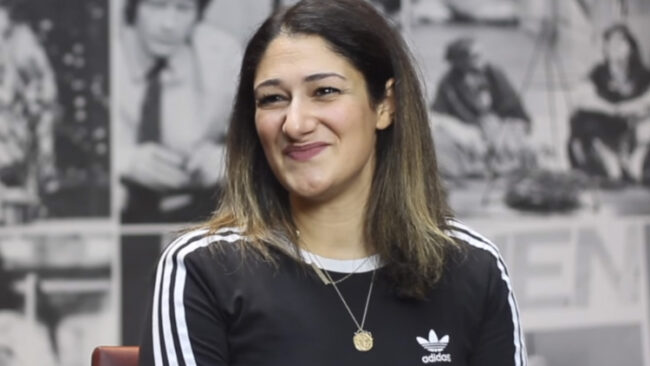
Interview with writer Georgia Christou
Your play centres around six children who are all competing in a TV quiz to determine who is the ‘brightest’ young thing. How did you first become interested in the topic of child geniuses?
I’d watched the real-life Channel 4 programme Child Genius and was struck by how the competition attracted young people from all different backgrounds, with all sorts of different reasons for being there. So it struck me as an exciting way to pull together a diverse line-up of characters with a common goal. I was also thinking a lot about ‘talent’: is it hard work that makes a person exceptional or is it something innate? With the popularity of reality TV, I think there’s a dangerous myth about being ‘found’; that you’re on a supermarket checkout one day and then the next you’re going to be discovered and all your problems will melt away. Like a quick fix for life. I’d love the young people performing the play to think about what has brought each of the characters to the competition – what they think winning the show will fix for them?
You’ve used the familiar setting of a TV competition show for Bright. Young. Things. Do you think competition amongst young adults can help them raise their game or is there a danger that not doing well will damage them?
For some people competition is really healthy and really important – it’s what drives them. For others it can be debilitating, especially if the environment you’re competing in is badly set up. I don’t think comparing yourself to other people is always helpful. In the play, I used the set-up of twins to show that everything about them was the same; they’d eaten the same breakfast; lived in the same house etc, so why is one of them ‘better’ than the other? Is it useful for them to be comparing themselves in this way and competing against each other? Or do they just need to be striving for their own goals?
One of the many fascinating things about Bright. Young. Things. is that you’re using a theatre to portray a TV show. When you imagine the play on stage, within this TV setting, how do you see it?
In the text I have tried to encourage companies to be as theatrical as they dare to be. The setting is a TV studio, but the piece is most definitely a play and needn’t feel like a piece of TV. I’d love it, for example, if as much sound as possible could be live. To me there’s an exciting contrast, between the fakeness of the television show and the real liveness and honesty a group of young performers can create. I don’t think you need any TV props – the less you rely on that and the more you go for a theatrical experience, the more fun you’re going to have with it. We all know what TV looks like and we don’t want this to feel the same – we want it to feel more heightened and playful.
The play was workshopped by Chichester Festival Youth Theatre. Did the script change a lot in those workshops – and if so, how? And was there anything particularly surprising?
The script changed loads! The redrafts have been really extreme from my very first draft which was really obscure and a bit bonkers. Playwriting is often a collaborative process and it was absolutely essential for me that I had those workshops. I was so helped by an army of people just to write a one-hour long play and I really needed all that support: the kids were great, the director was great, and Lucy (Kerbel) gave me loads of brilliant notes and guidance as well.
In the first read-through, the company just didn’t get it; it was just too complicated and there were too many characters. I was trying to squeeze too much in and the story became really tricky to follow. So from there it was a process of focusing the story, boiling down the ideas and stripping the text back.
All of the characters are so well defined and there’s a backstory to all of the named characters apart from Rochelle’s mum: the audience never know why she’s no longer living with Rochelle. Was this intentional so the audience and performers can make up their own minds?
I have my own thoughts about what might have happened in their home and I hope this point could be an open conversation that young performers can have. It might be different for each company and they might make different decisions about Rochelle’s mum but that’s a really important part of rehearsals. It happens in professional companies; there are blanks that you fill in. You as a company can know what’s going on but the audience doesn’t always have to know everything.
If you had one piece of advice to give to young people performing the play, what would that be?
Be as liberated or as free with the text as you want, and don’t feel like you have to do everything as it’s written down; it’s only there as a guide. I hope that it will be a fun experience, one that is about collaborating and working together. Every person is an important cog in creating the show, you will all need each other. The characters are all pretty stressed out so channel your energy into them, and hopefully you can just enjoy the experience of creating a show together.
And to a young person/drama teacher directing it?
Be bold and theatrical with it. For example, I always imagined the TV producers in the play were this many-headed beast, a monster with tentacles. The more you can play with that stuff, the more fun you – and your audience – will have. And I would encourage everyone having a go to do just that.
